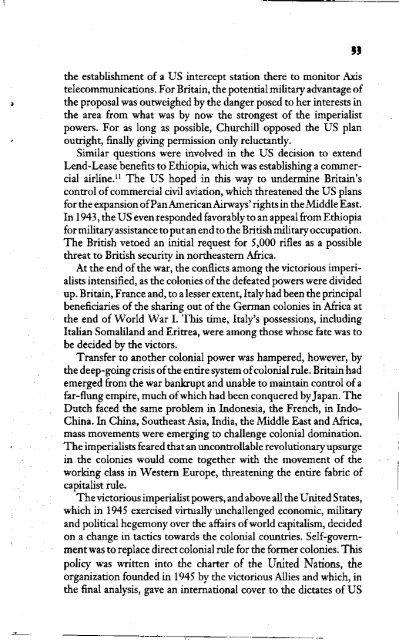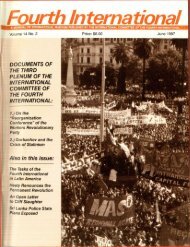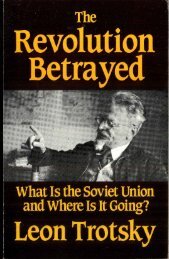Workers League - Behind the US invasion of Somalia - Mehring Books
Workers League - Behind the US invasion of Somalia - Mehring Books
Workers League - Behind the US invasion of Somalia - Mehring Books
Create successful ePaper yourself
Turn your PDF publications into a flip-book with our unique Google optimized e-Paper software.
<strong>the</strong> establishment <strong>of</strong> a <strong>US</strong> intercept station <strong>the</strong>re to monitor Axis<br />
telecommunications. For Britain, <strong>the</strong> potential military advantage <strong>of</strong><br />
<strong>the</strong> proposal was outweighed by <strong>the</strong> danger posed to her interests in<br />
<strong>the</strong> area from what was by now <strong>the</strong> strongest <strong>of</strong> <strong>the</strong> imperialist<br />
powers. For as long as possible, Churchill opposed <strong>the</strong> <strong>US</strong> plan<br />
outright, finally giving permission only reluctantly.<br />
Similar questions were involved in <strong>the</strong> <strong>US</strong> decision to extend<br />
Lend-Lease benefits to Ethiopia, which was establishing a commercial<br />
airline. 11<br />
The <strong>US</strong> hoped in this way to undermine Britain's<br />
control <strong>of</strong> commercial civil aviation, which threatened <strong>the</strong> <strong>US</strong> plans<br />
for <strong>the</strong> expansion <strong>of</strong> Pan American Airways' rights in <strong>the</strong> Middle East.<br />
In 1943, <strong>the</strong> <strong>US</strong> even responded favorably to an appeal from Ethiopia<br />
for military assistance to put an end to <strong>the</strong> British military occupation.<br />
The British vetoed an initial request for 5,000 rifles as a possible<br />
threat to British security in nor<strong>the</strong>astern Africa.<br />
At <strong>the</strong> end <strong>of</strong> <strong>the</strong> war, <strong>the</strong> conflicts among <strong>the</strong> victorious imperialists<br />
intensified, as <strong>the</strong> colonies <strong>of</strong> <strong>the</strong> defeated powers were divided<br />
up. Britain, France and, to a lesser extent, Italy had been <strong>the</strong> principal<br />
beneficiaries <strong>of</strong> <strong>the</strong> sharing out <strong>of</strong> <strong>the</strong> German colonies in Africa at<br />
<strong>the</strong> end <strong>of</strong> World War I. This time, Italy's possessions, including<br />
Italian Somaliland and Eritrea, were among those whose fate was to<br />
be decided by <strong>the</strong> victors.<br />
Transfer to ano<strong>the</strong>r colonial power was hampered, however, by<br />
<strong>the</strong> deep-going crisis <strong>of</strong> <strong>the</strong> entire system <strong>of</strong> colonial rule. Britain had<br />
emerged from <strong>the</strong> war bankrupt and unable to maintain control <strong>of</strong> a<br />
far-flung empire, much <strong>of</strong> which had been conquered by Japan. The<br />
Dutch faced <strong>the</strong> same problem in Indonesia, <strong>the</strong> French, in Indo-<br />
China. In China, Sou<strong>the</strong>ast Asia, India, <strong>the</strong> Middle East and Africa,<br />
mass movements were emerging to challenge colonial domination.<br />
The imperialists feared that an uncontrollable revolutionary upsurge<br />
in <strong>the</strong> colonies would come toge<strong>the</strong>r with <strong>the</strong> movement <strong>of</strong> <strong>the</strong><br />
working class in Western Europe, threatening <strong>the</strong> entire fabric <strong>of</strong><br />
capitalist rule.<br />
The victorious imperialist powers, and above all <strong>the</strong> United States,<br />
which in 1945 exercised virtually unchallenged economic, military<br />
and political hegemony over <strong>the</strong> affairs <strong>of</strong> world capitalism, decided<br />
on a change in tactics towards <strong>the</strong> colonial countries. Self-government<br />
was to replace direct colonial rule for <strong>the</strong> former colonies. This<br />
policy was written into <strong>the</strong> charter <strong>of</strong> <strong>the</strong> United Nations, <strong>the</strong><br />
organization founded in 1945 by <strong>the</strong> victorious Allies and which, in<br />
<strong>the</strong> final analysis, gave an international cover to <strong>the</strong> dictates <strong>of</strong> <strong>US</strong><br />
33





